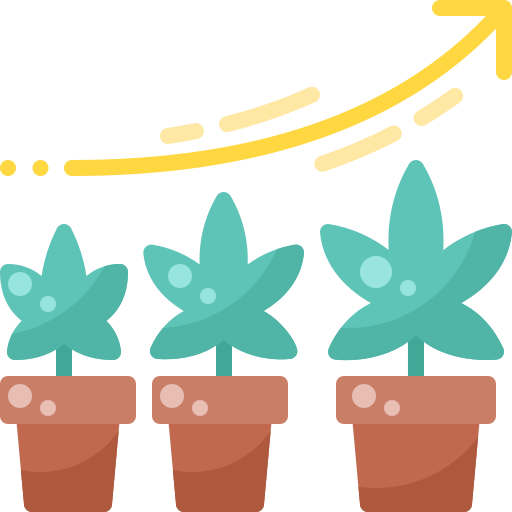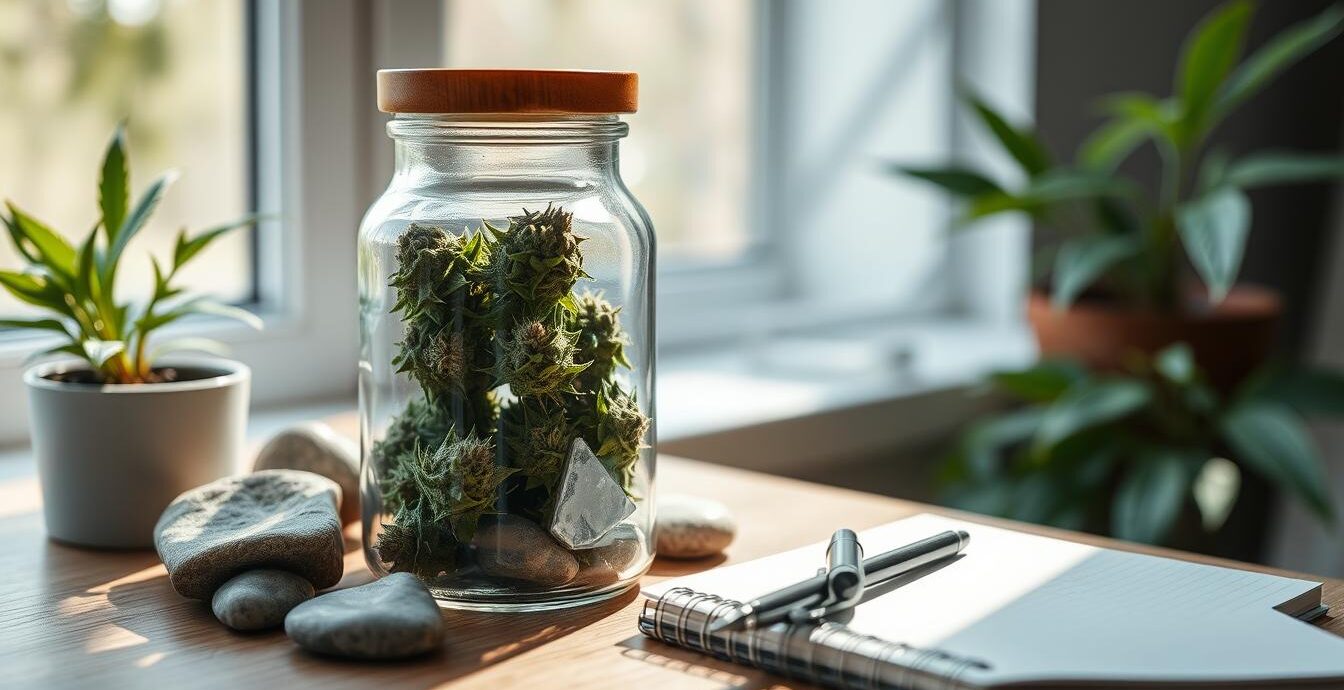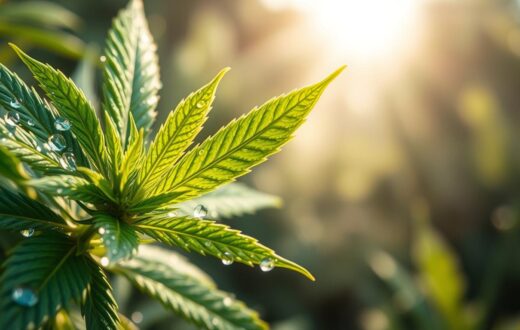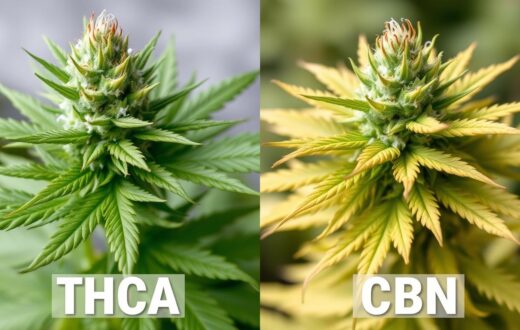Ever wondered why your favorite cannabis strain doesn’t pack the same punch it used to? You might be dealing with THCA tolerance. This phenomenon can sneak up on even the most seasoned cannabis users, leaving them scratching their heads and reaching for higher doses.
THCA tolerance is a complex dance between your body and cannabinoids. As you consume cannabis more frequently, your system adapts, leading to a decrease in sensitivity. This natural process can affect both recreational and medical users, potentially impacting the benefits they seek from cannabis.
Understanding and managing your THCA tolerance is crucial for maintaining the effectiveness of your cannabis regimen. Whether you’re using cannabis for relaxation, pain relief, or other therapeutic purposes, keeping your tolerance in check ensures you get the most out of each dose.
In this guide, we’ll explore the ins and outs of THCA tolerance, from its development to strategies for management. We’ll dive into the science behind cannabinoid tolerance, discuss factors that influence it, and provide practical tips for keeping your cannabis experience fresh and effective.
So, if you’ve noticed your usual dose isn’t cutting it anymore, or you’re simply curious about optimizing your cannabis use, stick around. We’re about to embark on a journey through the world of THCA tolerance that might just change the way you approach your cannabis consumption.
Understanding THCA: A Brief Overview
THCA, or tetrahydrocannabinolic acid, is a key part of raw cannabis plants. It’s not intoxicating but plays a big role in the plant’s health. Knowing about thca tolerance and levels is key to understanding its effects.
What is THCA?
THCA is the early form of THC, the psychoactive part of cannabis. It’s found in fresh, unheated plants. Unlike THC, THCA doesn’t make you feel high. This makes it appealing for those wanting cannabis benefits without the high.
How Does THCA Differ from THC?
THCA and THC have different chemical structures. THCA has an extra group that gets removed when heated. This change, called decarboxylation, turns THCA into THC. Knowing this is important for understanding thca tolerance and tolerance buildup.
Benefits of THCA Consumption
Research shows THCA might have many health benefits. It could help with inflammation, like in arthritis. It might also protect the brain and help with nausea and appetite loss. These benefits make THCA a promising area of study, especially for managing tolerance levels and avoiding THC buildup.
The Concept of Tolerance in Cannabis Use
Cannabis tolerance is important for regular users. It means the body gets used to cannabinoids and needs more to feel the same effects. This is true for both those who use it for fun and those who use it for health reasons.
What is Cannabis Tolerance?
Cannabis tolerance happens when the body gets less sensitive to THC, the main active part of cannabis. This makes the effects of cannabis less strong over time. Users might need more THC to get the effects they want, which can lead to problems with using cannabis too much.
How Tolerance Develops Over Time
Tolerance grows as CB1 receptors in the brain become less active to THC. Studies show that daily users have fewer CB1 receptors. This changes how cannabinoids work in the body.
This change can happen fast, sometimes in just days of using a lot of cannabis. How often you use it and how much you use can affect how fast tolerance builds up.
Knowing about cannabis tolerance is key to managing it. Ways to reduce tolerance include taking breaks from using cannabis and trying different ways to use it. Some people increase their tolerance by slowly changing their dosage or trying new strains with different THC levels. Using products with CBD can also help control THC’s effects and manage tolerance.
Factors Affecting THCA Tolerance Levels
THCA tolerance levels can change over time, influenced by several key factors. Understanding these can help users manage their consumption more effectively.
Frequency of Use
How often you use THCA products plays a big role in tolerance buildup. Regular use can lead to faster tolerance development. If you consume THCA daily, you might notice a need for higher doses to achieve the same effects over time.
Dosage Considerations
The amount of THCA you consume impacts your tolerance levels. Higher doses can speed up tolerance buildup. It’s wise to start with small amounts, especially for beginners, and increase gradually. This approach helps gauge sensitivity and manage tolerance more effectively.
Biological Factors
Your body’s unique makeup affects how quickly you build tolerance to THCA. Factors like weight, metabolism, and gender can influence tolerance management. Some people naturally have a higher sensitivity to cannabinoids, which can impact their tolerance levels. The potency of THCA products, particularly concentrates, can also lead to rapid increases in tolerance.
Remember, THCA becomes more potent when heated, so smoking or vaping can result in faster tolerance buildup compared to consuming raw THCA. Proper tolerance management involves understanding these factors and adjusting your consumption habits accordingly.
Signs of THCA Tolerance
Using cannabis products can change how your body reacts. These changes might mean you’re building up a tolerance to THCA. Knowing these signs helps you use cannabis wisely.
Physical Indicators
One sign of tolerance is needing more cannabis to feel the same effects. You might find your usual dose doesn’t cut it anymore. Some people notice they’re not as hungry or that pain relief isn’t as strong.
Sleep patterns can also change. These signs show your tolerance is growing.
Emotional and Mental Effects
Tolerance can also affect your mood and mind. You might not feel as relaxed or happy when using cannabis. The good feelings might not last as long.
Some people even get cranky or have trouble sleeping without cannabis. These changes suggest growing tolerance. Paying attention to these signs helps you manage your cannabis use.
Strategies for Managing THCA Tolerance
Managing THCA tolerance is key for maintaining its benefits. Let’s explore effective strategies to keep your tolerance in check.
Cycling and Breaks
Cycling tolerance involves alternating periods of use and abstinence. This method prevents tolerance buildup and helps reset your body’s sensitivity. Taking tolerance breaks, even for a few days, can significantly reduce tolerance levels.
Some users find that limiting THCA use to weekends or evenings helps maintain lower tolerance.
Microdosing Techniques
Microdosing is a great way to enjoy THCA benefits while reducing tolerance. The universal THC microdose is considered to be 5 mg per day. Dr. Allan Frankel recommends 3 mg daily, while Dr. Dustin Sulak suggests 1 mg of THC with 1 mg of CBD.
This approach maximizes benefits without the high, potentially saving money and helping reset tolerance for heavy users.
Adjusting Dosage
Gradually reducing your intake can help lower tolerance. Start with small doses and increase slowly to find your sweet spot. Changing your consumption method, like switching from smoking to edibles, can also help decrease tolerance.
Using products with specific doses, such as Full Spectrum Oil or 1:1 CBD and THC products, aids in dose control and tolerance management.
The Role of Diet in Tolerance Management
Our diet affects many health aspects, including how we handle cannabis. What we eat can change how sensitive we are to THCA, the non-psychoactive part of THC. Knowing this can help us control our cannabis use better.
Nutrients That Support Sensitivity
Some nutrients boost our body’s sensitivity to cannabinoids. Omega-3 fatty acids, found in fish and flaxseeds, help our endocannabinoid system work better. Foods high in antioxidants, like berries and nuts, aid in detoxing. This detoxing might reduce tolerance buildup over time.
Foods to Include and Avoid
Eat a variety of colorful fruits and veggies to manage tolerance. Mangoes, rich in myrcene terpenes, might make cannabis effects stronger. Avoid too much sugar and processed foods to keep sensitivity to THCA. A diet full of nutrients supports health and helps manage tolerance.
While diet is important, it’s not the only factor. How often you use cannabis and your body’s biology also matter. Always talk to a healthcare professional before changing your diet or how you use cannabis.
The Importance of Hydration
Staying hydrated is crucial when using THCA. Water helps your body process cannabinoids better. This can change how you feel their effects. Let’s look at how hydration impacts THCA and get tips for staying hydrated.
How Water Affects THCA Processing
Drinking enough water helps your body detox naturally. This can clear cannabinoids from your system, possibly lowering tolerance. Water also reduces dry mouth, a common side effect of cannabis.
Staying Hydrated: Tips and Tricks
To stay hydrated and manage tolerance, drink water all day. Drink more during breaks or when changing your cannabis use. Keep a water bottle with you and set reminders if you need to.
Eating foods high in water, like fruits and veggies, also helps. Hydration is a simple way to manage THCA tolerance.
Alternative Consumption Methods
Trying different ways to use THCA can help manage tolerance. Let’s explore some options that might help you reduce tolerance and keep the effects you want.
Sublingual vs. Edibles
Sublingual products, like tinctures, give quick results. They go straight into your system, which might affect tolerance differently than smoking. Edibles, on the other hand, last longer. They might build up tolerance slower but can have a stronger effect.
Terpene-Rich Products
Full-spectrum extracts with terpenes might make THCA’s effects better. This could mean you need less product to get the desired results. It’s a smart way to reduce tolerance. These products work through the entourage effect, where different cannabis compounds work together.
Rotating between these methods keeps your body guessing. This strategy helps keep your sensitivity to THCA high and provides varied experiences. Remember, everyone’s body reacts differently. Pay attention to how these methods affect your tolerance levels. With some experimentation, you’ll find the right balance for your THCA use.
Assessing Your THCA Tolerance Levels
Understanding your thca tolerance is key to using cannabis well. We’ll look at ways to check your tolerance and when to get help.
Self-Assessment Techniques
Keep a journal to track your cannabis use. Note how much you need and how long it lasts. This helps you see your tolerance change over time.
Watch how your body and mind react after using cannabis. If you need more to feel the same effect, your tolerance might be growing.
When to Consult a Professional
If cannabis use affects your daily life or treatment, see a healthcare provider. They can give you advice on managing your tolerance. They’ll help adjust your cannabis use based on your needs.
Remember, thca tolerance is different for everyone. Things like genetics, how often you use it, and how you consume it matter. Regular checks and talking to your healthcare provider help keep your cannabis use balanced.
The Psychological Aspect of Tolerance
The mind has a big role in how we feel cannabis. Our thoughts and feelings can change how THCA affects us. This mental side is key for tolerance management. Let’s explore how our minds connect with cannabis use.
Mindfulness and Cannabis Use
Being aware of how cannabis makes you feel can help with tolerance management. Pay attention to your body and thoughts when using THCA. This mindfulness can guide you in reducing tolerance over time. It lets you notice small changes that might mean your tolerance is increasing.
The Impact of Stress
Stress can make you want to use more cannabis. This can lead to building tolerance faster. Finding ways to relax without cannabis is important. You might try deep breathing or yoga. These can help in managing stress and keeping your tolerance in check. Remember, a calm mind can make your cannabis experience better and help in reducing tolerance.
Knowing how your mind affects your cannabis use is powerful. It gives you tools for better tolerance management. By staying mindful and managing stress, you can keep your THCA tolerance balanced. This approach helps you get the most out of cannabis while avoiding overuse.
Research on THCA and Tolerance
Recent studies have uncovered new insights into THCA tolerance and cannabis use. Scientists are looking into how our bodies react to these compounds over time. This research is key to understanding tolerance buildup and its effects on cannabis users.
Recent Studies and Findings
Studies reveal that our bodies quickly get used to cannabis. This is due to CB1 receptor desensitization from frequent use. It shows that tolerance can grow in just days of regular use.
The good news is that tolerance can drop quickly when we take breaks. This is important for those who use cannabis regularly.
Interestingly, THCA has medical benefits without the high. It has anti-inflammatory and neuroprotective effects. On the other hand, THC offers pain relief and stress reduction but can also cause euphoria and anxiety.
The process that changes THCA to THC increases its psychoactive effects. About 87.7% of THCA turns into THC, making it more potent.
Implications for Cannabis Users
It’s vital for cannabis users to understand tolerance buildup. It changes how our bodies react to THCA and THC over time. Users might need to adjust how much they consume to get the desired effects.
Ongoing research aims to reveal more about long-term effects of THCA use. These findings could guide future guidelines for use and medical applications.
For now, users should watch how their bodies react to cannabis. Recognizing tolerance signs helps manage use effectively. As research continues, we’ll learn more about using THCA and THC wisely for both fun and health reasons.
Legal Considerations in the U.S.
The laws about THCA in the U.S. are complex and keep changing. As people talk more about cannabis and THCA tolerance, it’s important to know the state laws. This helps users manage their tolerance levels.
State-by-State Variations
THCA’s legal status varies a lot across the U.S. Some states have laws just for THCA, while others cover it under broader cannabis rules. This makes it hard for people to know how to use THCA legally.
Federal vs. State Laws
Even though federal law still sees cannabis as illegal, many states have their own rules. For example, in New York, adults 21 and older can have up to three ounces of cannabis for personal use. But, these state laws don’t change the federal rules. This creates a confusing legal situation for THCA users.
Staying Informed
Because cannabis laws are always changing, it’s crucial for users to keep up with local laws. Knowing these laws is essential for managing cannabis or THCA tolerance levels. Remember, following the law is as important as knowing your personal tolerance when using THCA products.
Conclusion: Finding Your Balance with THCA Tolerance
Managing your sensitivity to THCA is a personal journey. THCA, found in fresh cannabis plants, has unique benefits without the high until heated. Knowing how your body reacts to THCA is crucial for effective tolerance management.
Final Tips and Affirmations
THCA tolerance can change based on how often you use it and the amount. To keep your tolerance in check, try cycling between THCA and other cannabinoids like CBD. Microdosing can also help reduce tolerance while still enjoying THCA’s benefits.
Stay hydrated and eat a balanced diet to help your body process cannabinoids naturally.
Encouraging Responsible Use
Responsible THCA use means regularly checking in with your body and adjusting your habits as needed. Notice how different methods and strains affect you. For example, THCA from OG Kush might differ from Girl Scout Cookies.
If you’re new to THCA, start with small doses and gradually increase them. Remember, everyone’s body is different. By being informed and mindful, you can find the right balance in your THCA use.















